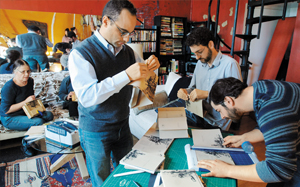Printed by hand
A small press revitalizes bookmaking—as bone-folded, hand-sewn, group-produced art.
By Melissa F. Pheterson
Photography by Adam Nadel, AB’90
It was production day at Crumpled Press headquarters. The editors—Jordan McIntyre, AB’99; Alexander Bick, AB’99; Aaron Tugendhaft, AB’99, AM’06; and Nicholas Jahr—convened on a Saturday in January to churn out the press’s newest batch of Codex in Crisis, a 64-page treatise on book digitization by Princeton historian Anthony Grafton, AB’71, AM’72, PhD’75. But the scene at McIntyre’s Brooklyn loft was more craft circle than assembly line. And the dozen workers, paid in cheese and pretzels, looked downright happy to snip string and strips of glue, slice paper, fold covers ejected from an Epson printer, feed books into the drill press, and slide black thread into spines. The session wrapped at 8 p.m. with 78 fresh books, each binder’s initials proudly scrawled in the colophon of his or her creation.

Editors Tugendhaft, Bick, and McIntyre cut and fold at a binding party.
“It’s like quilting,” says McIntyre, a graduate student at New York University, who had opened his apartment for what the editors call a binding party. “It’s a homespun model that people miss.”
The Crumpled Press, the brainchild of McIntyre and Bick, publishes work by new authors and sets previously unpublished, notable lectures and articles into proper books—hand-sewn—on culture, politics, self-reflection, and poetry. “It’s original, thought-provoking work that might otherwise be tossed aside,” says Bick, who is pursuing a history PhD at Princeton. “Hence the name Crumpled Press.” In the four years since the outfit’s birth, they’ve published nine titles—from a series of fictional voicemails placed on 9/11 to a meditation on Darwinian selection, sexuality, and fashion—priced from $5 to $25. Crumpled Press sold out of its 100 copies of When I Wished I Was Here: Dispatches from Fallujah (2007) by Derek McGee, a friend of Bick’s, after his reflections on his Iraq combat tours appeared on Slate’s army blog, the Sandbox. To replenish the supply, the editors threw more binding parties. The book has now sold more than 700 copies.
In 2005 the press took shape when McIntyre fished out from under his bed a series of poems he’d written for his undergraduate English thesis. “I figured I’d take the Whitmanian route and publish them myself,” he says of the collection, Still Leaves. Typesetting in Microsoft Word, he bound the poems in textured paper, and as a surprise his mother embroidered the cover with needlepoint leaves.
Today the four editors work with each author to create a book’s artisanal feel, reproducing journal sketches or deliberating fonts, flyleaves, and covers, to savor the printed-page aesthetic in an era of digitized technology—including sites for e-books, such as Google Books or the Amazon Kindle. Grafton’s Codex in Crisis reflects on this very topic. Expanded from a 2007 New Yorker article, the book was first released in a limited edition of 250 copies, each hand-numbered with a letterpress cover and holding a fold-out color plate.
“Publishing today is like a beauty pageant, all feeding into the same system,” says McIntyre. “There’s a singularity of standards passed down by the major publishing houses, in much the same way Miss America dictates the standards of Miss Illinois. Crumpled Press books might be thrown away because they don’t have a place in publishing—they’re too personal or too different.”
The press’s methods rely on “back-solving”—observing and adapting techniques of larger publishers while using the resources available to them. Early on, McIntyre aligned pages inside a phone book before punching holes to create a spine. He learned how to saddle-stitch from one of his mother’s art books, and designed a wooden rack to help with drilling. As it’s evolved, the outfit has invested in a drill press, an $850 paper-cutter, and a photo printer.
The books have been sold on consignment and at stores like Hyde Park’s 57th Street Books, as well as online and at author events. The editors pour profits into operating capital, and they regard their labor as happily donated. Over the years the friends have fine-tuned their binding parties, phasing out such hazards as red wine—though sometimes a needle-poked finger can dribble blood onto the page, as with Tugendhaft’s copy of Codex. “We perish to publish,” he jokes.
In fact, rather than perishing, Crumpled Press is flourishing. Although its first four publications sold only ten to 30 copies each, Codex’s sales have approached 400. “The standard line is that digitization kills books,” says Bick. “I think it’s more accurate to say there’s a symbiosis. The Internet generates most of our sales. We use digital technology like laser printing to produce our books.” The press’s increased sales figures may owe a debt to its unique business model, as consumers are drawn to the books’ tactile richness. Says Bick: “Our success contradicts the idea that bookmaking no longer makes sense.”
WRITE THE EDITOR
E-MAIL THIS ARTICLE
SHARE THIS ARTICLE
RELATED LINKS
RELATED READING
- UChiBLOGo: Phoenix Pix | Crumpled Press (November 17, 2008)
- Princeton Alumni Weekly: Grafton on Digitization and the Future of Libraries (July 16, 2008)
- The New Yorker: Future Reading (November 5, 2007)
